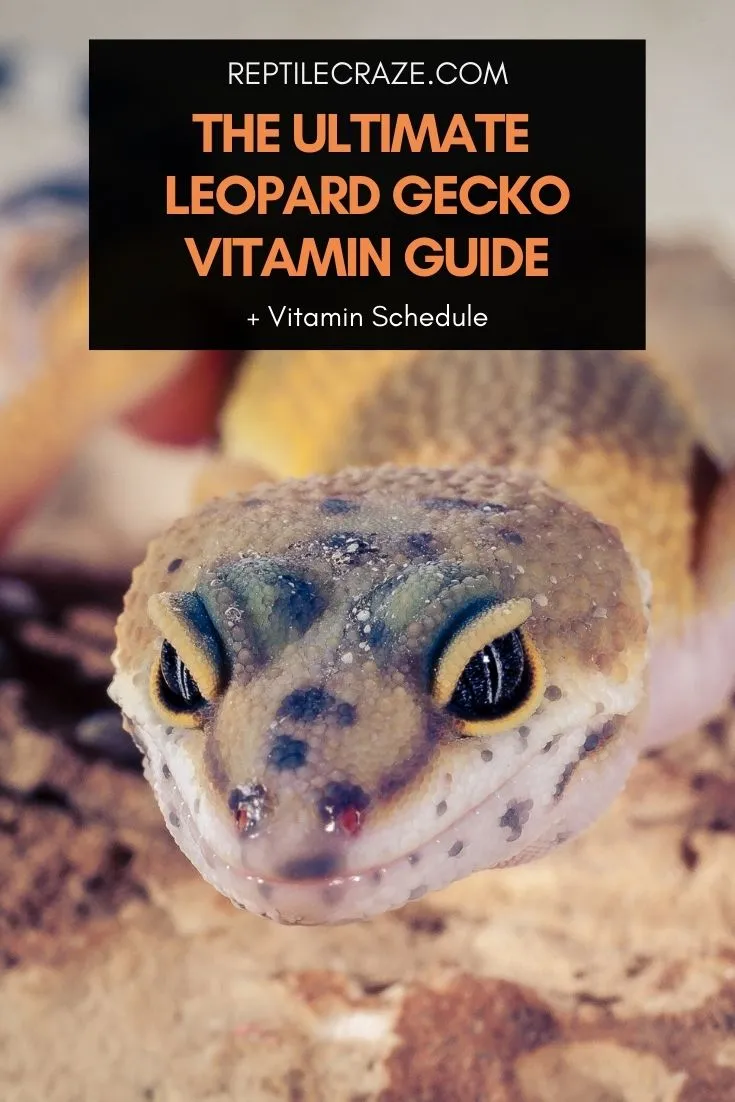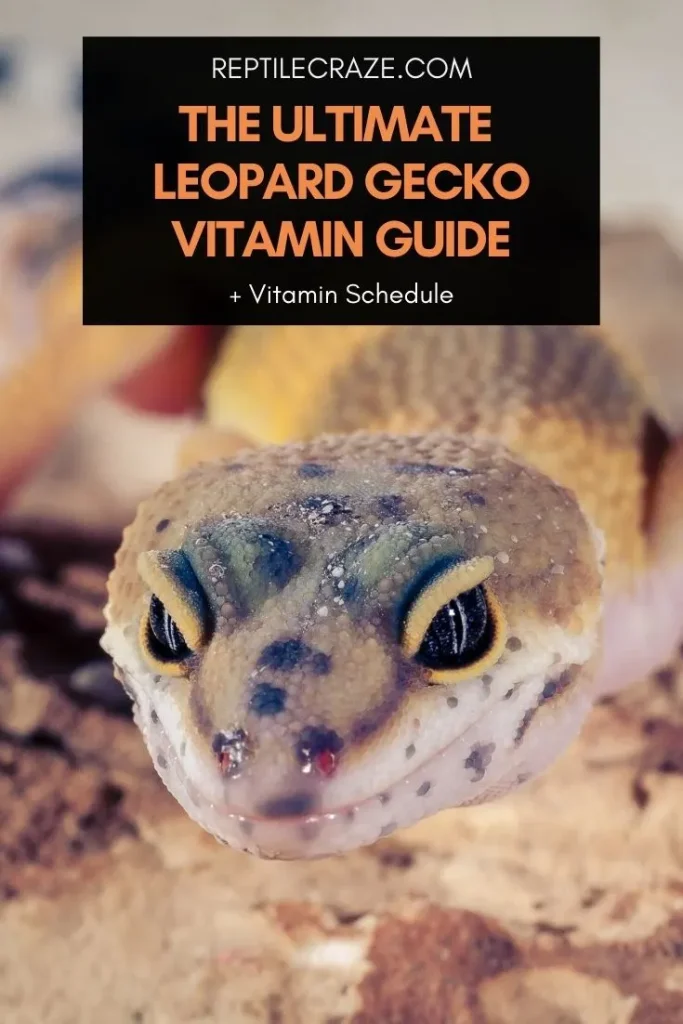Leopard geckos are fascinating creatures that are commonly kept as pets. As a responsible pet owner, it’s important to understand the nutritional needs of your leopard gecko to ensure they are healthy and happy. One important aspect of their diet is vitamins, which play a crucial role in their overall well-being.
Vitamins are essential for leopard geckos as they help maintain their immune system, promote healthy bone growth, and aid in digestion. Without these essential vitamins, leopard geckos may suffer from various health issues such as metabolic bone disease, lethargy, and decreased appetite. Therefore, it’s important to provide a balanced diet that includes the necessary vitamins to keep your leopard gecko healthy and thriving.
Leopard geckos require a balanced diet that includes vitamins and minerals. Some essential vitamins for leopard geckos include vitamin D3, calcium, and vitamin A. Vitamin D3 helps with calcium absorption, while calcium is essential for healthy bones and egg-laying. Vitamin A is necessary for proper vision and immune system function. A well-balanced diet, including gut-loaded insects, vitamin and mineral supplements, and occasional feeder mice, can provide the necessary nutrients for a healthy leopard gecko.

What Vitamins Do Leopard Geckos Need?
Leopard geckos are fascinating creatures that require specific vitamins to maintain their health and well-being. These vitamins aid in the growth, development, and overall health of leopard geckos. In this article, we will discuss the different vitamins that leopard geckos need to stay healthy.
Vitamin A
Vitamin A is essential for the proper growth and development of leopard geckos. It plays an important role in maintaining healthy skin, vision, and a robust immune system. Leopard geckos cannot produce vitamin A themselves, so it is important to include it in their diet.
Leopard geckos can get vitamin A from a variety of sources, including pre-packaged commercial food, insects, and vegetables. However, it is important to note that too much vitamin A can be toxic to leopard geckos. Therefore, it is essential to ensure that they receive an adequate amount of vitamin A without over-supplementing.
Vitamin D3
Vitamin D3 is crucial for the proper absorption of calcium, which is essential for strong bones and teeth in leopard geckos. Without adequate vitamin D3, leopard geckos may develop metabolic bone disease, which can lead to deformities and other health complications.
Leopard geckos can obtain vitamin D3 from both their diet and UVB lighting. However, it is important to ensure that they receive enough UVB lighting to properly absorb vitamin D3. A lack of UVB lighting can lead to deficiencies in vitamin D3, which can be detrimental to the health of leopard geckos.
Calcium
Calcium is an essential mineral that is required for the proper growth and development of leopard geckos. It is essential for strong bones and teeth, as well as proper muscle function. Leopard geckos require a diet that is high in calcium to maintain their health.
Leopard geckos can obtain calcium from a variety of sources, including pre-packaged commercial food, insects, and calcium supplements. It is important to ensure that they receive an adequate amount of calcium to prevent deficiencies, which can lead to metabolic bone disease.
Vitamin E
Vitamin E is an important antioxidant that is required for the proper function of the immune system in leopard geckos. It helps to protect cells from damage caused by free radicals, which can lead to health complications.
Leopard geckos can obtain vitamin E from a variety of sources, including pre-packaged commercial food, insects, and vegetables. It is important to ensure that they receive an adequate amount of vitamin E to maintain a healthy immune system.
Vitamin K
Vitamin K is essential for proper blood clotting in leopard geckos. It helps to prevent excessive bleeding and other complications that can arise from wounds.
Leopard geckos can obtain vitamin K from a variety of sources, including pre-packaged commercial food, insects, and vegetables. It is important to ensure that they receive an adequate amount of vitamin K to prevent bleeding complications.
Vitamin B1
Vitamin B1 is essential for the proper function of the nervous system in leopard geckos. It helps to maintain healthy nerve cells and proper muscle function.
Leopard geckos can obtain vitamin B1 from a variety of sources, including pre-packaged commercial food, insects, and vegetables. It is important to ensure that they receive an adequate amount of vitamin B1 to prevent nerve damage and other health complications.
Vitamin B2
Vitamin B2 is essential for the proper function of the metabolism in leopard geckos. It helps to convert food into energy, which is essential for growth and development.
Leopard geckos can obtain vitamin B2 from a variety of sources, including pre-packaged commercial food, insects, and vegetables. It is important to ensure that they receive an adequate amount of vitamin B2 to maintain a healthy metabolism.
Vitamin B6
Vitamin B6 is essential for the proper function of the immune system in leopard geckos. It helps to maintain healthy immune cells and prevent infections.
Leopard geckos can obtain vitamin B6 from a variety of sources, including pre-packaged commercial food, insects, and vegetables. It is important to ensure that they receive an adequate amount of vitamin B6 to maintain a healthy immune system.
Vitamin B12
Vitamin B12 is essential for the proper function of the nervous system in leopard geckos. It helps to maintain healthy nerve cells and prevent nerve damage.
Leopard geckos can obtain vitamin B12 from a variety of sources, including pre-packaged commercial food, insects, and supplements. It is important to ensure that they receive an adequate amount of vitamin B12 to prevent nerve damage and other health complications.
Conclusion
In conclusion, leopard geckos require a variety of vitamins to maintain their health and well-being. These vitamins include vitamin A, vitamin D3, calcium, vitamin E, vitamin K, vitamin B1, vitamin B2, vitamin B6, and vitamin B12. By ensuring that they receive an adequate amount of these vitamins, leopard geckos can live long and healthy lives. It is important to provide a balanced diet that includes a variety of foods and supplements to meet their nutritional needs.
Frequently Asked Questions
What vitamins do leopard geckos need?
Leopard geckos require a variety of vitamins to maintain their health. The most important vitamins that they need are calcium, vitamin D3, and vitamin A. Calcium is essential for strong bones and proper muscle function, vitamin D3 helps the gecko absorb calcium, and vitamin A is important for vision and immune system health.
It’s important to note that leopard geckos can suffer from vitamin deficiencies if they don’t receive adequate nutrition. Signs of vitamin deficiency include lethargy, lack of appetite, and weight loss. To prevent this, make sure your gecko’s diet includes a variety of vitamin-rich foods and consider using a calcium and vitamin supplement to ensure they are getting all the nutrients they need.
How can I provide my leopard gecko with enough calcium?
Calcium is a vital nutrient for leopard geckos, as it helps build strong bones and muscles. There are several ways to provide your gecko with enough calcium. One of the easiest ways is to offer calcium-rich foods like crickets, mealworms, and other insects. Dusting their food with a calcium supplement is also a good idea.
Another way to provide your gecko with calcium is to offer a calcium dish. This is a small dish filled with calcium powder that your gecko can lick as needed. It’s important to make sure that the dish is always filled with fresh powder and that it’s not contaminated with feces or other debris.
What foods are rich in vitamin A?
Vitamin A is an important nutrient for leopard geckos’ vision and immune system health. Some foods that are rich in vitamin A include dark, leafy greens like kale and collard greens, as well as orange and yellow fruits and vegetables like carrots, sweet potatoes, and mangoes. Liver is also a good source of vitamin A, but it should only be fed occasionally as it’s high in fat.
It’s important to note that feeding too much vitamin A can be harmful to your gecko’s health. Signs of vitamin A toxicity include lethargy, lack of appetite, and weight loss. To avoid this, make sure to offer a balanced diet that includes a variety of vitamin-rich foods.
How often should I dust my gecko’s food with calcium and vitamin supplements?
It’s important to provide your leopard gecko with adequate nutrition, including calcium and vitamin supplements. How often you should dust their food with these supplements depends on the age and health of your gecko. Generally, younger geckos need more calcium than adults, so it’s recommended to dust their food every feeding. For adults, dusting their food once or twice a week is usually sufficient.
When it comes to vitamin supplements, it’s important to follow the manufacturer’s instructions for dosage and frequency. Over-supplementing with vitamins can be harmful to your gecko’s health, so it’s important to use supplements in moderation.
Can I give my leopard gecko multivitamin supplements?
While it’s important to provide your leopard gecko with a balanced diet that includes a variety of vitamin-rich foods, some owners choose to supplement their gecko’s diet with multivitamin supplements. However, it’s important to use these supplements in moderation, as over-supplementing with vitamins can be harmful to your gecko’s health.
If you do choose to give your gecko multivitamin supplements, make sure to follow the manufacturer’s instructions for dosage and frequency. It’s also important to avoid supplements that contain high levels of vitamin A, as this nutrient can be toxic in large amounts. As always, consult with a veterinarian or reptile specialist if you have any questions or concerns about your gecko’s diet.
How to SUPPLEMENT your LEOPARD gecko | 2022
In conclusion, leopard geckos require a balanced and varied diet to ensure they receive all the necessary vitamins and nutrients. A diet consisting of live insects such as crickets and mealworms, as well as gut-loaded insects and occasional fruit or vegetable treats, can provide a diverse range of vitamins and minerals essential for leopard gecko health.
It is important to note that leopard geckos also require access to a source of calcium and vitamin D3 to support their bone health. This can be achieved through supplements such as calcium powder or by providing a UVB light source.
Overall, by providing a balanced diet and necessary supplements, leopard gecko owners can ensure their pets are receiving the vitamins they need to thrive and lead healthy lives.


